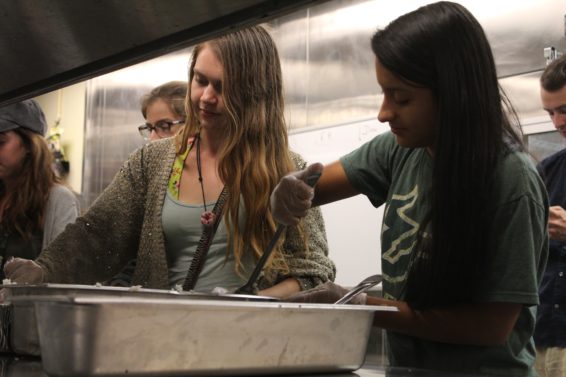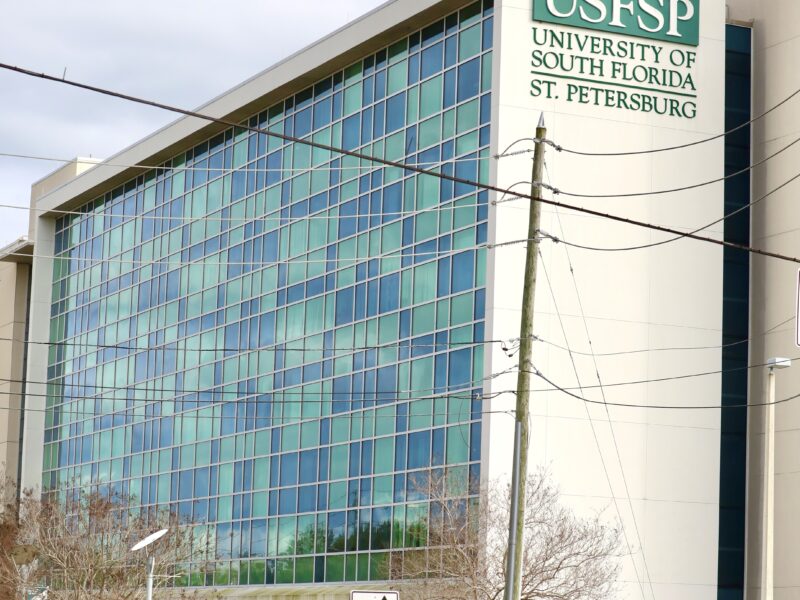Twice a week, anxious students gather on the benches outside of the USC.
They head inside right before The Reef closes at 9 p.m. If you’re not paying attention, you might miss them before they disappear into the kitchen.
Hats-on-head and gloves-in-hand, they stand in front of giant plastic containers and coolers. An employee brings out the food. An electronic scale and large, metal spoons appear.
The students are members of USF St. Petersburg’s Food Recovery club. They package the food and donate it to the ALPHA House, a local women and children’s shelter.

Claire Graham, 19, is a junior biology student with a minor in anthropology. She is also the founder and president of Food Recovery.
“People can make a difference — anyone can. Everyone has something to offer and can really make an impact on the community,” she says.
The club is attempting to do just that. It meets twice a week to rescue The Reef’s leftovers. According to Graham, the members gather anywhere between 30 to 50 pounds on average.
Items range from rice to chicken to green beans. On some days they might score something special, like the uneaten wraps and sandwiches from an event catered by Panera Bread. Anything that goes unserved on a Tuesday or Thursday might be fair game.
In the process of feeding people, they are protecting the environment.
“We’re diverting that waste from landfills, where it would degrade and release harmful gases into the environment,” she says. “Waste has a lot of unseen costs.”
Graham first got the idea while at an Association for the Advancement of Sustainability in Higher Education conference. That’s where she discovered the Food Recovery Network, the parent organization that the club is a chapter of.
Initially, it was going to be a project under Student Government’s department of sustainable initiatives. It became apparent early on, however, that Food Recovery was much more than that.
Brian Pullen, the sustainability coordinator for the college, became the club advisor. Louis Duran, the general manager of Sodexo, wasn’t an easy person to get in contact with. But once they spoke, he was quick to get on board with the idea of donating excess food.
But for Graham, making sure that food isn’t wasted is only part of the solution.
“My passion is not only in environmental issues but on social issues as well. And they really go hand in hand. Sustainability solutions are, a lot of times, really good community solutions,” Graham said.
It is with this in mind that the food is brought to ALPHA House. The organization’s mission is to “provide housing and supportive services to homeless pregnant women and teens, new mothers with infants, and families experiencing crisis pregnancies.” According to Graham, the shelter houses up to 16 women and their children at any given time.
Tiffany Scott has worked there for 11 years. She cooks during the day and assists them in whatever way she can in the evening. She says she is thankful for donations by generous organizations such as Food Recovery.
“I see them every week and we’re happy to have them. I don’t know how to put it in words,” Scott said.
According to Feeding America, a United States-based nonprofit focused on feeding the hungry, approximately 70 billion pounds of food is wasted in America each year. While Graham’s club might not be able to put a dent in that overnight, it does its part and has repurposed over 600 pounds worth of food since starting in January.
Prospective volunteers contact Graham and sign up using Google Sheets. They are told to wear closed-toed shoes and hats if they have them. According to Graham, they are the driving force behind the movement.
First-time volunteer Paulina Montoya, a junior who is also studying biology, found out about the group on the Know-It-All’s-Guide.
“I thought it was awesome. It’s not very time consuming and it’s for a good cause. The best part is, it’s not even crappy food, it’s actually good food that is being donated,” Montoya said.
Keairra Trimble is Graham’s roommate. She is a sophomore biology student and is the vice president of Food Recovery.
She likes to go camping, garden or have any excuse to be outdoors. She also loves helping people.
“When we delivered the food to ALPHA House and they told me they were so full and stuffed, that was great,” Trimble said. “We really want to help the community and not just those on campus.”
Byron Baugh, along with Graham and Trimble, is one of the original members of Food Recovery. He is a senior environmental science student and is the secretary of the club.
He likes playing games. When he isn’t playing “The Legend of Zelda: Breath of the Wild” or “Magic: The Gathering” he is pretty content with his Tuesday and Thursday nights.
“Every single time it always leaves you with that feeling that it’s the best thing you’ve done all week,” he said.
For Baugh, this is something he’s been looking to get back into for quite some time.
“I’ve had a pretty long history of doing stuff like this with Christian youth groups,” Baugh said. “I’ve always been looking for a way to do this type of work that falls in line with my more secular beliefs now.”
On Wednesday, March 29, the club had its first official meeting outside of the twice-weekly recoveries. They met in the Butterfly Garden, where it was decided that Monday would be added as a new recovery day.
Graham says that the ultimate goal is for no food on campus to be wasted. With more volunteers and more time, she thinks that they can achieve this. But for now, she’s simply grateful for all the people who show up and help make a difference.
“It’s such a testament to the fact that people care. In today’s political climate, people are so hopeless sometimes. But people do care,” Graham said.
As part of Earth Day celebrations during the week of April 17, Food Recovery will host “Bulls Bucks Drive” and will be stationed outside of The Reef on select days. The club is hoping that residential students who find themselves with a surplus of funds left on their meal plans at the end of the year will consider donating to their cause.
For more information about how to get involved, contact Food Recovery at cgraham6@mail.usf.edu

![Reef Recovery: Paulina Montoya and [insert name] gather excess food from The Reef as members of the Food Recovery Club. They collect food twice a week and donate it to a local shelter. Michael Moore Jr. | The Crow's Nest](https://crowsneststpete.com/wp-content/uploads/2017/04/Food-Recovery.jpg)

